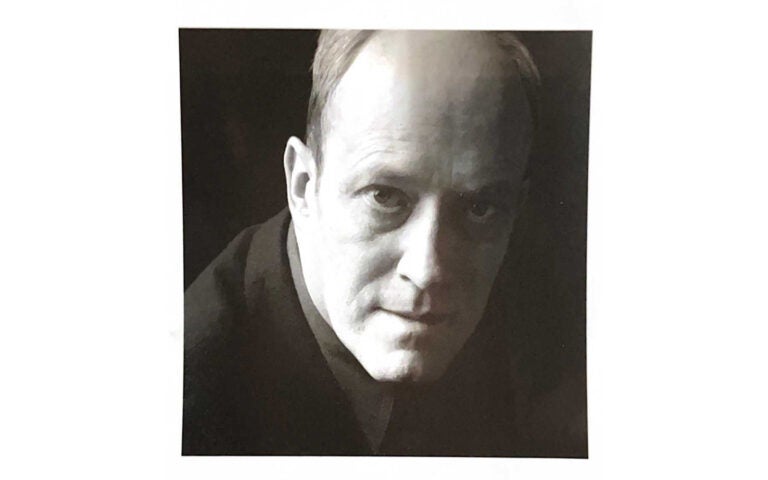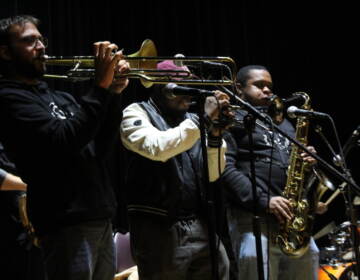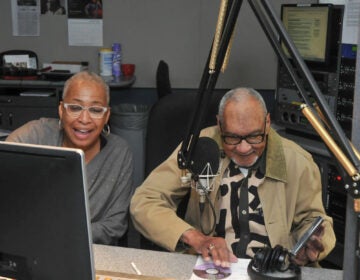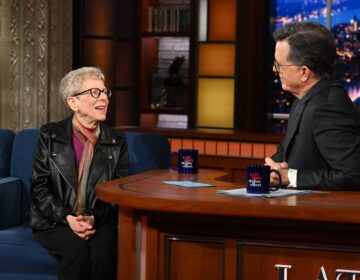Francis Davis critiqued jazz as a ‘force for understanding who we are’
The renowned Philadelphia writer and spouse of “Fresh Air” radio host Terry Gross died April 14 at the age of 78.
Listen 3:07
An undated photo of jazz critic Francis Davis (Courtesy of Terry Gross via ''Fresh Air'')
From Philly and the Pa. suburbs to South Jersey and Delaware, what would you like WHYY News to cover? Let us know!
If Francis Davis were chasing a Holy Grail, it might have been John Coltrane.
The jazz great played his last Philadelphia show in 1966 at Temple University, where Davis, as a student, saw Coltrane for the first and only time. Although the sparsely attended show and its recording issued 48 years later both got mixed reviews, it spurred Davis’ resolve to write about jazz, a pursuit that propelled the rest of his life.
A prolific critic for The Philadelphia Inquirer, The Atlantic magazine and The Village Voice and an author of seven books, Davis won a Grammy award for his liner notes on the 50th anniversary reissue of Miles Davis’ “Kind of Blue.” For decades, he supposedly worked on what many believed would be the definitive book about Coltrane.
The promise of a Coltrane book, written at a level readers had come to expect from Davis, had become part of jazz lore.
“Talk to anyone in the jazz community and they’ll bring that up: ‘Isn’t he working on the Coltrane book?’” said jazz promoter Mark Christman, founder of Philadelphia’s Ars Nova Workshop. “I’m not sure if it was a recurring joke or if we were all just really anticipating something.”
Outside of music circles, Davis, 78, was known as the husband of Terry Gross, host of WHYY’s “Fresh Air” on National Public Radio. He died April 14 from complications of emphysema and Parkinson’s disease. Davis will be memorialized during a private event in his hometown of Philadelphia.
Davis’ writing
Davis was not a musician and never learned to read music, but he had an uncanny ear for technical musicianship, enabling him to not only explain to readers what was happening in music, but also why it made them feel a certain way.
For example, in a 1987 review of the Ornette Coleman album “In All Languages,” Davis describes a song’s “conflicting tempos” and “multiple keys” before arriving at the effect it makes on the listener.
“Coleman’s solo is one of the most inspired he’s recorded,” Davis wrote. “In one sense, it’s little more than a series of thematic variations beginning and ending with the same graceful ascending phrase. But with his speech-like cadences and inflections, and his logically yet unpredictable rush of ideas, Coleman almost makes you forget that he’s playing an instrument. He could be thinking out loud.”
Gross was drawn to her future husband through his writing. Davis was working in a West Philly record store in the 1970s when “Fresh Air” started on WHYY as a local radio program. He submitted scripts for music segments to be reviewed for editing.
During a 2017 appearance on “The Tonight Show Starring Jimmy Fallon,” Gross admitted that was when she started to fall for Davis.
“His use of language was so great,” Gross said. “I started falling in love with him, his writing, and his taste in music all at the same time.”
What did Davis cover?
Although Davis grew up and lived in Philadelphia, most of the time his focus was not on the local scene. With some exceptions, such as championing Philly artists like Dave Burrell and Sumi Tonooka, he kept his eye on the larger jazz world.
The Philadelphia Clef Club, the nearly 60-year-old jazz organization on South Broad Street, is now seeking permission from The Atlantic to use Davis’ jazz columns for educational purposes. Oscar Payne, managing director, said he wants to incorporate Davis’ archive of reviews into his curricula for younger students.
“I see firsthand how jazz changes lives. Francis Davis understood that better than most,” he said. “He didn’t just critique the music, he captured its cultural heartbeat. His writing helped us frame jazz as not only an art form, but a force for understanding who we are.”
In 2018, Ars Nova booked musician Nels Cline to perform a special, Philadelphia-centric big-band concert. Christman asked Davis to write a short essay connecting Cline, a guitarist known for his work with the Chicago-based band Wilco, with the legacy of Philadelphia jazz, including Coltrane and his disciple McCoy Tyner, whose song “Aisha” Nels covered.
The essay goes deep into Coltrane’s legacy and the ability of his bandmates to maintain a semblance of his genius after his death. Near the end, Davis wrote a few lines that could be applied to himself after his own death.
“The goal of the finest interpreters, regardless of what label they or others put on their music, is to make us hear a piece of music their way,” Davis wrote. “For us to hear, and respond to, the qualities they do, some of which might seem apparent only after they’ve pointed them out.”
“Francis was an extraordinary interpreter himself, just like the musicians he wrote about,” Christman said. “He made us hear the music differently, understand it more deeply. There’s an intensity you get from reading Francis. That intensity is from his own listening and conviction.”
Christman recalled that when Cline performed his “Lovers (for Philadelphia)” concert in June 2018, he saw Davis and Gross sitting in the front row.
There is little to indicate that Davis’ mythical Coltrane tome will emerge posthumously. Perhaps that will be the notes never played, to paraphrase another Davis (Miles), to make the notes played shine brighter.

Get daily updates from WHYY News!
WHYY is your source for fact-based, in-depth journalism and information. As a nonprofit organization, we rely on financial support from readers like you. Please give today.







